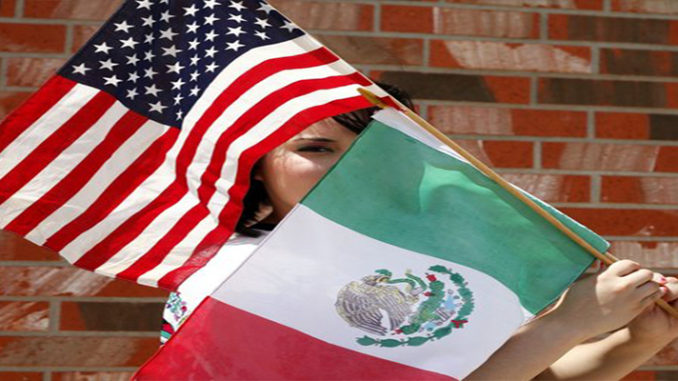
by Alex Gonzalez
 The results from the Florida primary last Tuesday point to one thing; most Cuban-Americans voted for Mitt Romney despite dismal favorability for Romney among Hispanics in the southwest where the highest concentration Mexican-Americans live. In Florida, Cuban Republican Politicians, like Rep. Ileana Ros-Lehtinen, Rep. Mario Diaz Balart said that “they differed with Romney on immigration, but thought his tough message on Cuba was consistent with what is expected for Republican candidates who visit and court South Florida Republicans.” Indeed, the views for Republican Cuban-Americans are that the only policies “Hispanics” in south in Florida care about is anti-Castro rhetoric and very little about the issues important to other Hispanic groups. More importantly, this result from Florida shows that the Republican Party’s habitual national approach to woo Hispanics needs to be updated and adjusted from its elusive “Hispanic” national “minority” identity. For Republicans to assume that all Hispanics are the same and can be lumped together under the same issues is a total failure to win Hispanics or Mexican-Americans into the Party, at least in the Southwest.
The results from the Florida primary last Tuesday point to one thing; most Cuban-Americans voted for Mitt Romney despite dismal favorability for Romney among Hispanics in the southwest where the highest concentration Mexican-Americans live. In Florida, Cuban Republican Politicians, like Rep. Ileana Ros-Lehtinen, Rep. Mario Diaz Balart said that “they differed with Romney on immigration, but thought his tough message on Cuba was consistent with what is expected for Republican candidates who visit and court South Florida Republicans.” Indeed, the views for Republican Cuban-Americans are that the only policies “Hispanics” in south in Florida care about is anti-Castro rhetoric and very little about the issues important to other Hispanic groups. More importantly, this result from Florida shows that the Republican Party’s habitual national approach to woo Hispanics needs to be updated and adjusted from its elusive “Hispanic” national “minority” identity. For Republicans to assume that all Hispanics are the same and can be lumped together under the same issues is a total failure to win Hispanics or Mexican-Americans into the Party, at least in the Southwest.
The 2010 new census numbers showed that of the 50 million Hispanics in the US. But the census also showed that 63%, or 32 million, of Hispanics self-identify as “white.” Thus, it would seem important to suggest that Hispanics are not happy with an “invented” government bureaucratic label. Moreover, it shows that Hispanics are tired of the minority Hispanic labels that the Republican Party created in the 1970s. Consequently, it may be a good time for the GOP to start reevaluating its approach with a group of people that is no longer happy with the “minority” label, and the result from Florida shows that a national Republican “Hispanic” approach has failed since it does not represent the interests of all Hispanic groups in the nation.
Minority identity v. Hispanic identity
For Hispanics, being labeled as a minority poses a constant threat from the Republican establishment that preaches stringent American identity, thereby, making it difficult on Republican politicians to court a group of people that calls itself a “minority” because it raises suspicion of allegiances. Thus, the only alternative for the GOP has to maintain a non-minority majority for the future is to reverse the original plan from the 1970s when Nixon and Senior George W. Bush lumped all Hispanics together with other “minority” (races) and “invented” a Hispanic label and cast them outside the “ethnic white” groups like Jews and Italians. But this lumping together of all “Hispanic” groups has not worked for the last 30-years, neither for the Hispanic communities in the southwest and especially not Mexican-Americans, nor for the Republican Party.
Conceivably, turning Mexican-Americans in the southwest into a single Hispanic “minority” to unify them with other Hispanic groups in Florida and New York made sense in the 1970s when the population of Mexican Americans was only 4 million. But this forced a monolithic cultural approach has not worked as the Republicans initially intended. It has, instead, created an un-amicable relationship between Republicans and Hispanics because it puts a “minority” group—which may be perceived as an outside group– against white dominant establishment. In fact, the minority Hispanic label created by Republicans may have worked only for Liberals, Marxist pax-Hispanistas, and black leaders, but it has diminished the GOP appeal within many “Hispanic” communities. Conversely, the label Hispanic is equally offensive to older Republican whites who see Hispanics as a “non-white” outside group. Therefore, the term Hispanic is not achieving its Republican objective.
Moreover, even Hispanics, or Mexican-Americans, in the 1950s knew how important it was to remain within “white” census box for categorization purposes. For example, in Hernandez v. Texas Mexican-American lawyers in Texas had to go to US Supreme Court to argue that “Mexicans are…members of and within the classification of the white race as distinguished from members of the Negro Race.” This is particularly important because if Mexican-Americans in Texas were put under a different category than “white,” they would have to be sent to segregated schools; so the case was effective bringing attention on why Mexican-Americans needed to be under the “white” category. As a result, Hernandez v. Texas was not only about race, but more about the government’s categorization of people, and how detrimental, it is for some groups to be out in the wrong category. And Mexican-Americans in Texas and California knew it and they objected to being categorized as non-white minority.
 However, 20-years later, in seeking to organize a large national Hispanic bloc, Republicans “invented” a new classification of people, Hispanics; and simultaneously created a faux Republican Hispanic (RNHA) organization to represent an artificial classification. In essences, the GOP effectively created a new class of a “minority” Americans. Moreover, the Hispanic label itself has become so arbitrary that some people don’t know whether they are Hispanic or Latino. The term Latino/Hispanic itself is so confusing that some Republican “Hispanics” don’t even know whether they are white, or non-white, and thus, creating a cultural limbo. Even worse, many Hispanic Republicans, wanting to make the GOP appealing to Latinos, often only paint an elephant from red to brown to make it more “Hispanic” looking. But the browning of an elephant has also failed because the substantive issues Hispanics want to talk about are left out. So a brown elephant alone is not enough to create cohesive Hispanic Republican voting bloc because the term was just an invention to suppress the regional Mexican identity in the southwest with “Hispanic” label. And this is something that historians know about.
However, 20-years later, in seeking to organize a large national Hispanic bloc, Republicans “invented” a new classification of people, Hispanics; and simultaneously created a faux Republican Hispanic (RNHA) organization to represent an artificial classification. In essences, the GOP effectively created a new class of a “minority” Americans. Moreover, the Hispanic label itself has become so arbitrary that some people don’t know whether they are Hispanic or Latino. The term Latino/Hispanic itself is so confusing that some Republican “Hispanics” don’t even know whether they are white, or non-white, and thus, creating a cultural limbo. Even worse, many Hispanic Republicans, wanting to make the GOP appealing to Latinos, often only paint an elephant from red to brown to make it more “Hispanic” looking. But the browning of an elephant has also failed because the substantive issues Hispanics want to talk about are left out. So a brown elephant alone is not enough to create cohesive Hispanic Republican voting bloc because the term was just an invention to suppress the regional Mexican identity in the southwest with “Hispanic” label. And this is something that historians know about.
Amitai Etzioni of the Brookings Institute points out that the “invention” of the Hispanic Label was a government fabrication by politicians in the 1970s under the Nixon administration. Thus, Hispanics refuse to be labeled as a minority. This accidental label has forced Hispanics into a “minority status” rather than full incorporation into the “white” category as it gradually occurred with other non-white groups like Irish, Jews, eastern Europeans, and Italians.
Furthermore, Republicans need to be concerned of the minority “Hispanic” label because this minority label has been hijacked by Liberal progressives and African-American leaders because, under the “minority,” African-Americans too, benefit from a perception of underrepresented larger minorities; it is a coalition of minorities to unseat the “white establishment.” But, what then happens to all those 32 million of Hispanics who self-identify as “white” American in the US census. Who do they want to unseat? In essences for 32 million of Americans, the government deliberately classifies them as “minority.” Also, the term “Hispanic” only minimizes the political clout of each Hispanic group.
According to Peter Skerry, of the Wilson Quarterly E Pluribus Hispanics, the Hispanic label is used interchangeably by political small groups, like Cubans, to further their agenda by claiming to represent all Hispanics. However, this Hispanic identity is weak and easily fractured because it is a political creation and it does not really embody the group(s) experience that tend to strengthen a community. It is only when a community shares a common cultural experience that it can be built into political power.
Regional Character Matters to Hispanics more the Minority Labels
Cuban-Americans in Florida are successful and cohesive in advancing their agenda because their main goal is Castro, and they all rally behind that single goal—even Sen. Marco Rubio. Proof of this is how Cuban flags have become part of the landscape in the state of Florida while the Republican Party and the Cuban political power coalesce behind the anti-Castro rhetoric. Consequently, Republican candidates are forced to embrace the Cuban Diaspora of “libertad” to get votes. Cubans never embraced the “minority” Hispanic identity. The Cuban elite and political class only rally their anti-Castro, but they also see as an extension of dominant white ruling establishment. Therefore, a similar cultural experience is important to build political power; and Mexican-Americans have used cultural regional identity to build political clout within the Republican establishment.
The Republican Party in Texas used to have the Mexican-American Republicans of Texas who acted according to state and community needs The Mexican-American Republicans in Texas brand indeed spoke to conservative values and advocated for Communities in Texas. MART built a political relationship with the community, by organizing at the county level across the state. But unfortunately, the success of MART led to a copy-cat organization at the national level under Republican National Hispanic Assembly in 1970. As chairman of the National Republican Committee, George H.W. Bush, who had worked with MART in Texas, founded the national group but placed Benjamin Fernandez, a Californian, at its head. But, In 1975 MART asked, unsuccessfully, for the state Republican Party to recognize it rather than the Texas RNHA. As a result, MART’s voice in Washington was superseded by the Texas and National Assembly chapters, which Cuban Americans led, in Texas. Thus, the Republican Party, by seeking to project a more enlarged cohesive national Hispanic label, effectively tarnished the advancement of the Mexican-American Republican brand in Texas and the southwest.
The Republican Party used to work effectively with Mexican-Americans under MART, which acted according to state and needs of Mexican-Americans. However, when the National Republican Committee decided to take over such state and superimposed a national Hispanic organization—the National Hispanic Republican Assembly–in charge with leadership in Florida, but the national organization failed. In the following years, the RNHA failed when the organization unsuccessfully tried to organize Hispanics in the southwest from Florida. As a result, the organization became irrelevant and eventually left the southwest. Things got so bad for the NHRA that by 2008, only 2 chapters– one in Long Beach, CA and one in Dallas, TX–survived the intra-political feuds for power between the various groups that had different regional agendas. The lesson was that superimposing a national Hispanic brand is ineffective for Republicans. It is only when local regional “ethnic” Hispanic groups with the same cultural experience controlled the agenda that an effective cohesive GOP agenda can be built. Therefore, assuming that a group of “Hispanic” Republicans in Florida can manage the affairs of Mexican-Americans from Florida is under the Hispanic/Latino umbrella is an illusion.
 Cubans are mainly concerned with anti-Castro policies, Puerto Ricans with statehood, and Mexican-Americans and Central Americans with education and immigration reform. But, according to Skerry, this ever-present “Hispanic” de-emphasized country of origins with a “Hispanic” label only has diminished the political influence of large “Hispanics” (Mexicans) while giving control of the agenda to smaller groups (Cubans). So in setting up this Hispanic category by the government, politicians avoid the problems of attending each group’s demands and let the various groups “fight among themselves” for attention. The term “Hispanic” has been the term of choice for political convenience that led to lack of politician independent cohesiveness for some “Latino” groups. Therefore, in a desperate attempt to woo all Hispanics at once, the GOP naively created the “Hispanic” class of people to avoid dealing with each group country of origin like Mexicans, Cubans, and Puerto Ricans. But this approach has been a total failure for Hispanics in the Southwest. In fact, this approach suppressed practical successful local regional state Republican organizations that emphasized regional “Hispanic” character.
Cubans are mainly concerned with anti-Castro policies, Puerto Ricans with statehood, and Mexican-Americans and Central Americans with education and immigration reform. But, according to Skerry, this ever-present “Hispanic” de-emphasized country of origins with a “Hispanic” label only has diminished the political influence of large “Hispanics” (Mexicans) while giving control of the agenda to smaller groups (Cubans). So in setting up this Hispanic category by the government, politicians avoid the problems of attending each group’s demands and let the various groups “fight among themselves” for attention. The term “Hispanic” has been the term of choice for political convenience that led to lack of politician independent cohesiveness for some “Latino” groups. Therefore, in a desperate attempt to woo all Hispanics at once, the GOP naively created the “Hispanic” class of people to avoid dealing with each group country of origin like Mexicans, Cubans, and Puerto Ricans. But this approach has been a total failure for Hispanics in the Southwest. In fact, this approach suppressed practical successful local regional state Republican organizations that emphasized regional “Hispanic” character.
The Cubans in Florida want to focus their agenda on toppling Castro, the Mexicans in the southwest wanting to address immigration, trade with Mexico and education, and Puerto Ricans in New York want to push for statehood. Consequently, the idea that Hispanics from different regions of the county can be a cohesive political force under one single platform is unrealistic and difficult to achieve with less than one “Hispanic” “minority” label and is counter-productive for the Future of the Republican Party. It is even more detrimental for Hispanics themselves because the intra-fights create a stalemate originated from different regional “Hispanic” groups fighting for power and difference in priorities. And this is not good for the GOP or “Latinos” had to fight with other groups for the “Hispanics representation. Similarly, the GOP continuously struggles with the “minority” label when trying to reach out to Hispanics since the Republicans are perceived as the Party of “old whites.” Thus, creating a level of uncertainty with candidates and organizations in Latino communities.
Etzoni’s arguments that this Hispanic label has created a conundrum for Hispanics who wish to be white, yet are lumped together under a non-white category, and are thereby, perceived as minority, and possibly a needy community, has merit. The Hispanic label gives the impression that Hispanics are a different type of race, which conveys the message of “us and them, ” a minority group different from us. Not only are Hispanics lumped together to fight with other Hispanic groups for the attention of politicians, but they also lack political and cultural cohesiveness under the “minority” label.
Tomas Jimenez of Stanford in his book Replenished Ethnicity: Mexican Americans also argued that even though American society discriminated against the descendants of these early Mexican immigrants because of their ethnic origin, the children and grandchildren of these immigrants moved out of ethnically concentrated neighborhoods, joined the military, intermarried, and experienced socioeconomic Mobility and do not want to be called “minority’.
 But Jimenez also points out that Mexican Americans everyday experiences reveal that their ethnic identity is connected to contemporary Mexican immigration in ways that make that identity simultaneously more beneficial and costly. Mexican immigrant replenishment provides the means by which Mexican Americans come to feel more positively attached to their ethnic roots. But it also provokes a predominating view of Mexicans as foreigners, making Mexican Americans seem like less a part of the U.S. mainstream than their social and economic integration. But if third and fourth generations of Mexican-Americans feel cautious about their Mexican identity because it may treatment their middle-class status and assimilation, especial among Republicans, it means that other groups can use that against them to further suppress and prevent any cohesive Mexican-American Republican voting bloc, as it occurred with MART.
But Jimenez also points out that Mexican Americans everyday experiences reveal that their ethnic identity is connected to contemporary Mexican immigration in ways that make that identity simultaneously more beneficial and costly. Mexican immigrant replenishment provides the means by which Mexican Americans come to feel more positively attached to their ethnic roots. But it also provokes a predominating view of Mexicans as foreigners, making Mexican Americans seem like less a part of the U.S. mainstream than their social and economic integration. But if third and fourth generations of Mexican-Americans feel cautious about their Mexican identity because it may treatment their middle-class status and assimilation, especial among Republicans, it means that other groups can use that against them to further suppress and prevent any cohesive Mexican-American Republican voting bloc, as it occurred with MART.
Conversely, if Mexican Americans, especially old elites in Texas and California and New Mexico– in the southwest were to assert their historical regional character that would reinforce the notion that they are not a foreign culture, they could potentially drive millions of new Mexican-Americans to the Republican Party. This marriage of the old and the new generations would create a more assertive political force that can guarantee future regional voting bloc for Republicans under, as it happens in Florida with Cubans.
Therefore, the Republican Party needs to have a more realistic approach to the needs of Hispanics in the southwest and de-emphasize the “minority” label. Consequently, the GOP also needs to incorporate Hispanics into the “white” establishment by addressing the issues important to Mexican Americans, the same way they do with Cuban-Americans in Florida. Hispanics themselves prefer to be called by their national origin — Mexican, Cuban, Salvadoran, etc. So the elimination of a minority label can allow Mexican-Americans to have more leverage with the Republicans Party because they will have very specific demands unique to the southwest in six or seven states. The same is for Cuban-Americans who can get more political powers in Southern Florida and Newark New Jersey, where they can continue demand strong focus on toppling Castro.
Make It Right: Just call them Mexican-Americans To Make Them Strong
Samuel Huntington, in his book Who Are We, warned us about regional strengthening or assertive Mexican identity. However, as much of Huntingtonean that I am, the history of Texas shows that Huntington was wrong, as with the case of MART and Texas v. Hernandez. The History of Texas show that when the Mexican-American community came together on its own, it can be assertive in managing their own affairs and regional identity without an “invented” national Hispanic “minority” label; and this even under a Republican umbrella.
Similarly, conservative columnist Linda Chavez argues that “on most counts, Hispanics show great promise of becoming just another American ethnic group, like the Italians, Irish, and Germans “So long as we think of Hispanics as a single minority group, along with blacks, we will miss the great diversity within the Hispanic population.” I am not sure that Ms. Chavez is correct in arguing that a Hispanic non-minority identity is enough to enhance the political clout of Hispanics. As shown in Florida and Texas, the label does not fit all the groups’ interest, and thereby, makes it a weak identity to build political clout for Republicans. Would anybody tell Irish-Americans not to call themselves Irish and to not talk about Ireland because it may offend some in the Republican Party?
A national Hispanic label within the Republican Party has been, and is, a failure because a small Hispanic group is the beneficiary of this “minority invention” and an American pax-Hispanismo while the interests of largest group, the Mexican-American community, in the southwest have been largely neglected. Consequently, Mexican-Americans can only be successful, as they were in Texas with MART and winning the case of Hernandez v. Texas, if they act according to their own regional history and interest. It is their attachment to their region that can create enough passion and political clout to keep the region conservative and Republican to develop a cohesive regional bloc that can serve the interests of the Republican Party. Suppressing the Mexican-American with hope of a larger national Hispanic identity has been a failed approach that has given Democrats a strategic advantage. By 2042, there will be 100 million of American-Americans in the southwest. If the GOP continues to presume that by suppressing Mexican-American’s identity and history is a winning strategy, Republicans are on their way to be permanent “minority” themselves within the Mexican-American community and the Southwest.



